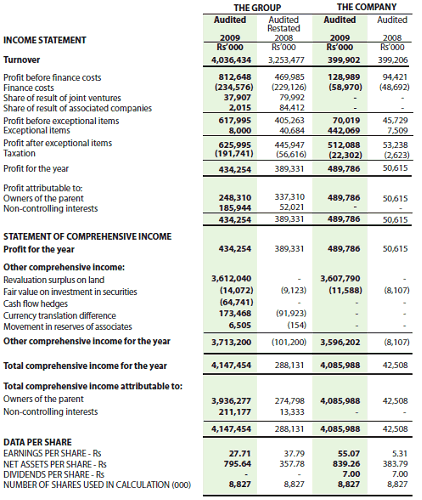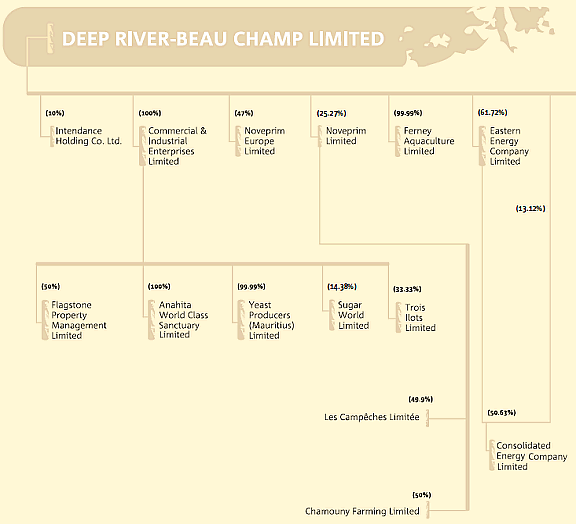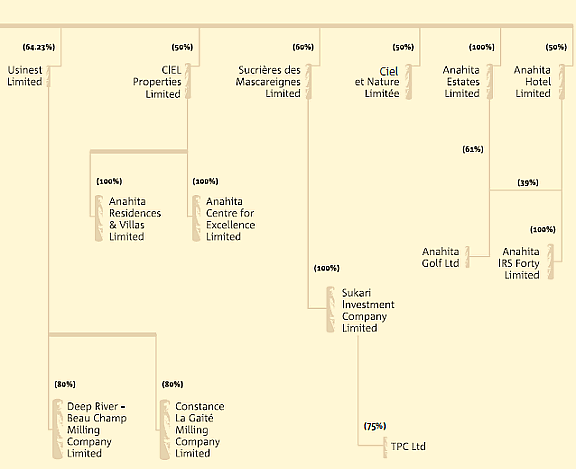 Ciel Agro-Industry
Ciel Agro-Industry
All data are collected in the Fiscal Year of 2008-2009.
Company Profile and History
CIEL Group is one of the leading industrial and investment groups based in Mauritius with operations in a number of African and Asian countries. The core activities of the Group are sugar, textiles and investment. It has three separate entities, namely CIEL Agro-Industry, CIEL Textile and CIEL Investment.
CIEL Agro-Industry regroups all the sugar related activities of the Group, and more recently, has been active in the promotion of the real estate and tourism development potential of its land assets. Through Deep River-Beau Champ Limited (DRBC) in Mauritius and TPC Ltd in Tanzania, CIEL Agro-Industry cultivates sugar cane on over 11,500 hectares.
In addition Consolidated Energy Co. Ltd in Mauritius is also involved in the generation of electricity from bagasse and coal.
DRBC, founded in 1912, cultivates 4,000 hectares of sugar cane, in the Eastern part of Mauritius around the villages Grande Rivière South East, Bel Air, Sebastopol and Ferney further south. Over recent years, significant investments have been made to increase the mechanisation of fields operations, which has now reached 54 percent of the area under cane.
Deep River-Beau Champ Milling Company Limited owns a sugar factory, situated in Beau Champ, processing 6,000 tonnes of cane per day, over a period of 130 harvest days.
Consolidated Energy Co. Ltd (CEL), situated next to the Deep River-Beau Champ sugar mill, started its operations in April 1998. CEL is an independent power producer, with an installed capacity of 25MW, the Company exports electricity to the national grid, under a Power Purchase Agreement. During the harvest, bagasse and during intercrop, coal, are burnt to produce 160 GWh of electricity annually, of which 50 GWh are for the sugar factory processing requirements and 110 GWh are exported to the national grid. The company is ISO 9001:2000 certified.
In Country Location
5th Floor, Ebene Skies, Rue de l'Institut, Ebene, Mauritius;
Phone (230) 404-2200, Fax (230) 404-2201
Services and Products
Deep River-Beau Champ Limited is involved in the production and export of sugar. Deep River-Beau Champ Milling Company Limited is involved in the milling of sugar cane and Consolidated Energy Co. Ltd generates power.
Deep River-Beau Champ Limited
| Cane Growing | |
|---|---|
| Area cultivated | 4000Ha |
| Average annual cane production | 320,000 t |
| Cane Yield per Hectare | 90 t |
| Average sucrose level | 12.25% |
Deep River-Beau Champ Milling Company Limited
| Factory Results Table | |
|---|---|
| Estate Canes | 315,000t |
| Planters & Metayers | 395,370 t |
| Total Canes Maniputaled | 691,870 t |
| Extraction Rate | 10.95 |
| Sugar produced inclusive of Raw & Special Sugars | 75, 738 t |
| Sugar Production 2006 | |
| Raw sugar | 60,000 t |
| Muscovado | 7,500 t |
| Demerara | 10,000 t |
| TOTAL | 77,500 t |
Consolidated Energy Co. Ltd
|
Power Generation Statistics Production capacity(GWh) |
|
|---|---|
| Coal | 99 |
| Bagasse | 61 |
| TOTAL | 160 |
Number of Employees
Deep River-Beau Champ Limited has 1,000 employees; Deep River-Beau Champ Milling Company Limited has 230 employees; and Consolidated Energy Co. Ltd (CEL) 35 employees.
Financial Information

Market Share
The average annual production of cane in Mauritius is 4,200,000 tonnes. Deep River-Beau Champ Limited’s average annual cane production is 320,000 tonnes.
Business Objective
“To be the competitive regional reference and a provider of expertise in the production of sugar cane and its derivatives. To optimise land and other resources for other agricultural produce and property development”
Business Model
“Deep River-Beau Champ Limited is committed, as a team, to use latest technology and seize new opportunities in Mauritius and in the region to maximize return from our industrial and land resources in the sugar cane and property development industries. This will be done through innovation and creativity, teamwork and continuous improvements.”
Ownership of Business


Benefits Offered and Relations with Government
In the light of decreasing sugar prices on Mauritius main export market, a new plan has been adopted to restructure the sector and ensure its long-term viability, while promoting alternative goods related to cane production. The Sugar Industry Efficiency Act 1988 provided for the preservation of agricultural land and the promotion of both sugar and non-sugar agriculture. In 2001, a new Sugar Industry Efficiency Act was adopted to consolidate, amend, and streamline the laws relating to the incentives applicable to the sugar industry to help the democratization of ownership in the industry, restore and maintain its efficiency and viability, and support the socio-economic development of Mauritius.
Under the Income Tax Act, every person who derives income from agriculture in an income year is allowed relief, by way of deduction of an amount equal to 15% of his net income from agriculture or MUR 100,000, whichever is lower. An annual allowance of 20% for income tax purposes is granted on the costs incurred in the clearance or improvement of land used or intended for use for agriculture (including the construction on agricultural land of any road, bridge, irrigation work or building used for agricultural purposes), and on the costs incurred on research for the purpose of establishing a new industry or expanding an existing one. Until 2007, income tax exemptions were granted to sugar planters and persons providing management services in relation to sugar cane cultivation.
Under the Development Incentives Act 1990, exemptions from payment of income tax on dividends paid out of income derived by a company holding an Agricultural Development Certificate (ADC) or an Agro-based Industry Certificate (AIC) are granted for 20 years (from its date of production or its date of operation). Exemptions from duty are also granted on machinery and equipment (excluding vehicles) for companies holding an ADC or an AIC, upon approval by the Ministry of Agro Industry and Fisheries (MAIF); on selected office equipment used by companies holding an ADC, upon approval by the MAIF; as well as on specialized spare parts of equipment used by companies holding an AIC. In addition, remissions of two thirds of municipal taxes are granted to companies holding an ADC during the tax exemption period, and remission of 50% on registration dues for the purchase of land and buildings to be used in relation to projects of companies holding an ADC or an AIC.
In 2007 Mauritius started the implementation of Sugar Industry Reform to ensuring the reengineering of the industry in the face of the drastic reduction of EU sugar prices. Mauritius exports most of its sugar production to the EC It has been benefiting from preferential access to the EC under the Sugar Protocol (SP) to the Cotonou Agreement (506,000 tonnes) and Special Preferential Sugar (SPS) Agreement (16,000 tonnes, declining). The SPS was replaced by the Complementary Quantity (CQ) system on 1 July 2006. In the 2006/07 crop year, Mauritius exported 487,000 tonnes under the SP. The SP guaranteed the price of €523.70 per tonne till 30 June 2006. The price is scheduled to decline to: € 496.80 from 1 July 2006 to 30 September 2008; €434 from 1 October 2008 to 30 September 2009; and € 335 as from 1 October 2009.
Mauritius' sugar exports also benefit from preferential access to the US market under the US Sugar tariff quotas; the minimum quota for Mauritius is 12,800 tonnes. Furthermore, under the SADC Sugar Protocol, Mauritius is allowed to export 1,500 tonnes of sugar duty free to the other SACU countries.
Exports of sugar and products with sugar content require a permit from the Ministry of Industry, Small and Medium Enterprises, Commerce and Cooperatives; the permit is subject to prior approval by the Mauritius Sugar Syndicate (MSS). The Mauritius' sugar industry has been supported by its preferential access to and remunerative prices in key markets. However, it is a high-cost producer, with costs over 50% higher than on the world’s leading "free" sugar markets. Labour accounts for some 55% of total production costs of sugar.
In the light of lower revenues for Mauritius' sugar producers, a new accelerated action plan for the sugar industry, the Multi-Annual Adaptation Strategy (MAAS) 2006-15, was set up. The MAAS is aimed at ensuring the long-term viability of the sugar industry, while promoting alternative goods related to cane production, and increasing its energy potential. The new plan also is aimed at reducing production costs and encouraging economies of scale by reducing the number of sugar mills (from the current 11 to four) and clustering together small farms. This reform involves also the mechanization of all practices (including cane harvesting, irrigation, and land preparation), and replanting fields with cane varieties with higher yields. All the inputs (including fertilizers, herbicides, and cement) will be provided at zero cost to eligible small farmers. The estimated cost of this reform programme is MUR 25 billion.
Several government bodies intervene in the sugar industry. The Mauritius Sugar Authority (MSA) is the coordinating body between the Government and the various organizations of the sugar industry. The MSS is the sole supplier of sugar to the local market and the sole sugar exporter. Its laboratory is in charge of inspecting and testing raw sugars. The main functions of the MSTC, jointly held by the Government and sugar producers, are the storage and loading into ships of the raw sugar produced by the 11 sugar factories; no other person, except with the authorization of the MSTC, can store or load sugar into ships. The industry also has its own insurance scheme, the SIFB. The Mauritius Sugar Producers' Association (MSPA), a private association, regroups the largest sugar producers.
Product Development
The Company has, together with Constance La Gaieté Company Limited, taken a stake of 32,5% in Fuel Refinery Limited which will produce some 150,000 tonnes of refined sugar annually as from October 2009.




